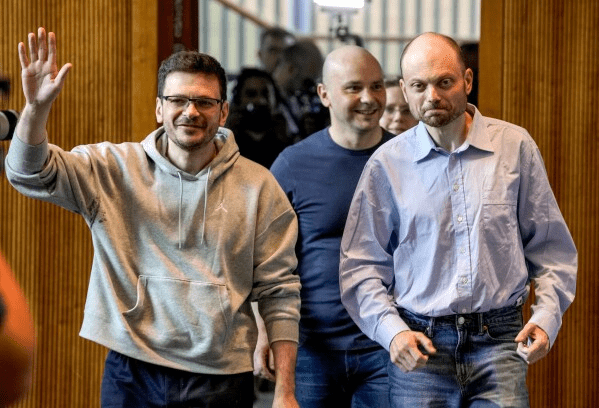
Russian Dissident Vladimir Kara-Murza Speaks Out After High-Stakes Prisoner Exchange: “I Thought I Would Die in Putin’s Prison”
Fiona Nanna, ForeMedia News
6 minutes read. Updated 5:04AM GMT Mon, 5August, 2024
Vladimir Kara-Murza, a prominent Russian opposition politician, has shared his dramatic story with the BBC following his surprising release in what is being hailed as the most significant prisoner exchange since the Cold War. Kara-Murza, who has endured severe hardships during his imprisonment, detailed his traumatic experiences and the emotional aftermath of his release.
Kara-Murza, now visibly thin and frail, attributed his condition to the intense stress he endured. In an exclusive interview, he expressed his disbelief at his sudden freedom, describing the experience as “surreal, like I’m watching a film,” yet one that he is relieved to be a part of, given it has allowed him to reunite with his family after more than two years apart. His youngest son has been particularly vigilant, staying close to him as he adjusts to his new reality.
The British-Russian citizen, sentenced to 25 years for his outspoken criticism of Vladimir Putin and Russia’s full-scale invasion of Ukraine, had spent over 11 months in solitary confinement. His daily routine was stark and dehumanizing: waking up at 5:00 AM to fold his bed, limited to only an hour of writing time, and devoid of meaningful human interaction. This harsh isolation was compounded by his existing health issues, including lingering effects from previous poisonings and recent warnings from a prison doctor that he might have just 18 months left to live if he remained incarcerated.
Kara-Murza’s ordeal took a dramatic turn last week when he, along with seven other Russian dissidents, was abruptly removed from their cells. The prisoners were initially unaware of the reason for their transfer. Kara-Murza recounted his fear as he was moved, believing he was being led to his execution. His fears were allayed when he was transported to Moscow’s Lefortovo FSB jail and then unexpectedly whisked away on a bus for what would turn out to be a high-profile prisoner swap.
Upon arrival in Germany, Kara-Murza’s attire consisted only of the black long-johns and T-shirt he had worn in prison, underscoring the dire conditions of his captivity. The swap included the release of notable figures such as American journalist Evan Gershkovich and members of Alexei Navalny’s team. In exchange, Russia received several prisoners, including Vadim Krasikov, an FSB hitman convicted of a high-profile murder deemed an act of “state terrorism” by the judge.
The controversial nature of the exchange has sparked debates, with Kara-Murza urging critics to focus on the lives saved rather than the release of Krasikov. The hitman’s return to Russia was marked by a celebratory reception by President Putin, raising questions about the ethics of such deals. Kara-Murza himself noted the complexity of the situation, expressing deep concern for those left behind, including political prisoners with serious health conditions.
Following his release, Kara-Murza has faced criticism from various quarters, including from Ukrainians who feel his statements on sanctions might undermine their struggle. Nevertheless, Kara-Murza remains resolute in his condemnation of the war in Ukraine and advocates for increased support from Western nations.
In reflecting on his future, Kara-Murza remains hopeful but cautious. He is barred from traveling and fears being “more constrained” in his advocacy. Despite this, he remains committed to denouncing the war and calling for continued international support for Ukraine. His final words as he left Russia, directed at an FSB guard who predicted he would never return, were hopeful: “I’m a historian, so I am sure I will be back in my country. And it will be much quicker than you think.”

